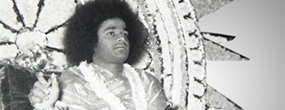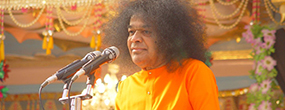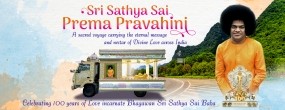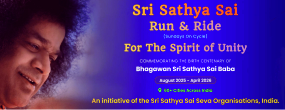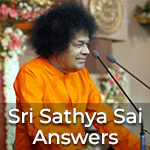
Discourse Date

Place

Occasion

Discourse Collection
The Effulgent Lord who shines in every atom and
pervades the entire universe will protect you always.
He is the Omnipotent Lord of Parthi, who will grant
you bhakthi (devotion), and will certainly help you
in all your endeavours.
What else is to be conveyed to this assembly of noble souls?
(Telugu Poem)
Embodiments of Love!
The body is made up of five elements and
is bound to perish sooner or later,
But the indweller has neither birth nor death.
The indweller has no attachment whatsoever and
is the eternal witness.
(Telugu Poem)
The deha (human body) with which we identify ourselves by saying “I” is subject to birth and death again and again. But, the Dehi (indweller), is the eternal Devadeva (Paramatma). While the vesture of deha (body) has birth and death, the Dehi is beyond birth and death and is omnipresent.
Consciousness has neither birth nor death.
It has neither beginning nor end.
It is present in all beings as the eternal witness.
(Telugu Poem)
Can you call all those who know how to read and write educated?
Can one be called educated merely for acquiring degrees?
Can you call it education which does not confer virtues?
If education is just for a living,
don’t we find birds and beasts carrying on their lives?
(Telugu Poem)
As long as there is bodily relationship between you and him, you call him your son. If the body perishes, whom do you call your son? All these relationships are worldly and physical. As long as the physical relationship exists, you consider someone your relative, friend, or foe. Hence, do not ever give excessive importance to these physical relationships. It is only when you rise above these physical relationships that you will realise the Antaryami (inner motivator). You may enquire from any of our boys, “Where is God?” They will spontaneously answer, “Everywhere. In fact, you are God.” Their relationship with God is beyond the physical level of the body.
You are always leading a life based on physical relationships. But these are not permanent. Such relationships exist today, but may cease to exist tomorrow. As long as there is life in the body, you say, “I am.” Once the body perishes, how can you call yourself “I”?
When you enquire into the matter deeply, everything in this objective world reduces itself to zero. All that we see in this world are zeros. Unfortunately, today we consider the zero as hero.
However, there is one fundamental principle, “I”, which is eternal. That fundamental principle is hero. It is present in every individual, but it is not noticed. It is the inner motivator.
We often refer to our human body consisting of flesh and blood as “I”. Our physical body is not eternal. It is like the passing clouds which come and go. Considering such transient body as the eternal “I”, we often struggle to keep the body in comfort. This is not the correct approach. The body must be employed for the purpose for which it was given to us. Man is born to realise the eternal truth.
Here is a small example. You performed the marriage of your son and brought a girl into your house, claiming her as your daughter-in-law. Before her marriage to your son, who was this daughter-in-law? The relationship ceases to exist once you leave this world. Such relationships are like passing clouds. Unfortunately, today we are passing our lives keeping such passing clouds as our true relationships. This is not the proper thing to do. Every individual should desist from leading a life based on dehabhimana (attachment to the body).
Even educated people have attachment to the body; they constantly strive to maintain the physical body, feeding it with comforts. It is only because of attachment to the body that they are exposed to sorrows and difficulties. Hence, shed body attachment and cultivate attachment to the Eternal Truth.
People crave for the darshan of Rama, Krishna, and other deities, which are the names given to the physical body donned by Divinity in different ages. As long as you are attached to the physical body, you cannot realise the Atma Tattwa. In fact, Atma does not have any attachment. The Atma is present in you, Me, and every individual and every living being – in keeping with the aphorism Ekatma sarva bhutantaratma (one Atma dwells in all beings). Realising the nature of such an all-pervading Atma is considered to be true spirituality – not just performing some rituals like worship, religious vows, and bhajans.
When someone asked Sita, “Where is your Rama?”, she replied, “Sri Rama is always with me only.” What people generally refer to is the physical body of Sri Rama, the son of King Dasaratha. In fact, the real Rama is not related to any individual – neither the son of some king nor the son-in-law of another king. He is immanent in every living being.
Keeping in view the bodily relationship, people often make enquiries, “Where did your uncle come from?” “Where did your aunt come from?”, etc. Suppose you question the same person, “Where did you come from?” He cannot give a correct answer.
The truth is that all people come from the same source. When one realises this truth, there will no more be any worry or sorrow. Hence, one has to realise this universal truth. If you do not develop faith in unity, but follow diversity, your entire life will be chaotic. Do not develop attachment to the world. Instead, cultivate spiritual attachment. When you live in harmony with your fellow human beings, you will derive happiness. Then you will enjoy the unity between human beings. The real devotee is one who has realised such unity. Unity leads to purity, which in turn leads to Divinity. One who has not experienced such unity, purity, and Divinity confines himself to body attachment and will be trapped in the birth-death cycle.
You are all aware of the havoc of tidal waves that shook the coastal villages on the east coast of India (tsunami), a few months ago. More recently, in America a very devastating hurricane submerged several towns and villages. The entire region presented the picture of a vast sheet of water. No one knew who survived and who died. Only after the water receded could an estimate of the extent of damage caused to life and property be made.
Embodiments of Love!
Eschew body attachment and realise the unity in divinity present everywhere. That is real sadhana. Today, people undertake sadhana to achieve something, all the while thinking of something else. As a result, they are unable to achieve their goal. Such divided attention is the fault of the concerned individual but not that of the objective world. Ensure that your sadhana is on the right track. Only then will you be able to realise the unity in diversity.
Several people live long years of age, some even 100 years. But they are unable to realise this unity. Instead, they visualise duality everywhere. This cannot be termed real sadhana. One who has realised the non-dual (advaita) Brahman alone can be considered to be a real manava (human being). Hence, try to realise the unity in diversity by removing the feelings of duality and experience bliss. In fact, unity is divinity, and that divinity is immanent in you. As long as you are under the influence of duality, you will not be able to realise that unity. Realise unity, experience unity and spread unity to the entire world. Unity alone brings purity and purity develops love. Only when you develop such pure love will you be able to understand everything in the spiritual realm.
I will take some other opportunity to explain in greater detail the concept of pure love. If you entangle yourself in worldly attachments and still aspire for divinity, how is it possible? Hence, keep yourself away from all attachments and attain unity.
(Bhagavan concluded His Discouse with the bhajan, “Prema Mudhita Manase Kaho”.)


